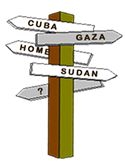“Your footage is breathtaking! I am blown away every time I open up a new tape. Your work will take us to a new level over here.” Packer School
FILM LOCALES
Each year, Take 2 sends a professional filmmaker to a different area of the globe for three months. The producer learns the principal local language, travels alone, and lives among the people she is filming. The result is in-depth footage rarely seen on the nightly news or even PBS specials.
How did we choose our filming locations?
1. The region or issue must be globally significant (the Middle East, Iraq, etc.).
2. The issues cannot be time sensitive (any conflict that will be over by the time the students get the footage).
3. It must be filmable (the Mexican drug trade wouldn't work).
4. The issues must be multifaceted.
5. The issues must not have obvious or easy answers (what to do with Gaza?).
6. It should not be too graphic (this is not a horror show).
7. It cannot be too dangerous for an independent producer to enter and move about (Chechnya and Somalia).
What sort of equipment did our field producers use?
It's a long list. Karin's "rig" for her Sudan/Chad field shoot weighed 72 pounds. Since the people she interviewed often spoke in a mix of Arabic and local dialects, it was imperative to get them translated in the field - therefore the portable laptop. Sudan/Chad are incredibly remote, so critical pieces of equipment - like cameras and microphones - had to have backups in case of breakdown. And finally, the lack of electricity in the refugee camps, villages, or often in the larger towns meant Karin used several methods to charge batteries, like solar panels and car batteries.
How do you prepare for a three-month film shoot in a war zone or conflict region?
Learn the local language - fluently! If you're going to be negotiating with rebels in Chad, you MUST speak Arabic - otherwise you might fall in with the wrong group and get "sold" to Khartoum. You also need to make contact with dozens of humanitarian organizations on the ground - both for advice and for help, if necessary. Read 60 bookshelf inches of books on your target region, and follow it closely in the news for at least a year before you go. Thoroughly learn the politics and religion(s) of the countries you plan to visit. Buy and wrap presents for all the family birthdays you're going to miss while you're gone, return your library books, let everyone know that you will not have access to the internet for the next few months, lie to your parents about how dangerous it's going to be, and pack up your filming rig.
Once you're home again, take a long, long hot shower, eat something that isn't a bug or an animal innard, and then settle down to a computer to spend the next 3-6 months creating background materials, summaries, and sequencing footage. And don't forget to start learning your next language!
For more details, here's or pre-and-post production schedule.


